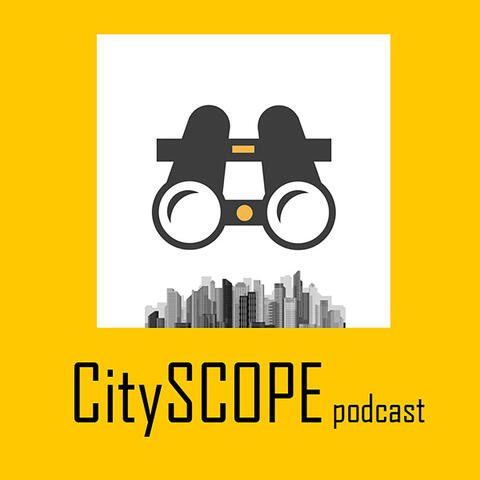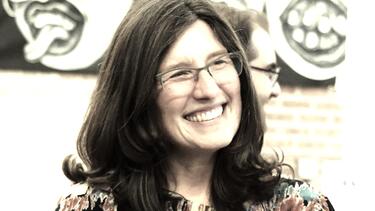CitySCOPE Podcast
Welcome to CitySCOPE, a podcast about cities and inclusive economic development from Kate Cooney and her students at the Inclusive Economic Development Lab at the Yale School of Management.

Subscribe to CitySCOPE Podcast in Apple Podcasts, Spotify, Google Podcasts, or your favorite podcast player.
Episodes
- Podcast
McDonald's and Black America
In Episode 6 of the CitySCOPE podcast Kate Cooney speaks with Marcia Chatelain, Professor of History and African American Studies at Georgetown University about her Pulitzer Prize winning book Franchise: The Golden Arches in Black America. Topics include: McDonald's trajectory from regional to national franchiser, McDonald's as a site of Civil Rights social movement activity, the fight for the right to franchise for Black entrepreneurs, attempts at restructuring McDonald's franchises into community ownership models, and what we can learn about Black capitalism through this history. Take a listen!
![McDonald's and Black America]()
- Podcast
The Stanley Tucker interview
In Episode 5 of the CitySCOPE podcast we share the interview with Stanley Tucker, Chief Executive Officer and co-founder of Meridian Management Company, Inc (MMG). Stanley has been in the business of supporting and scaling minority and women owned businesses for fifty years. Stanley began his career as Director of the Maryland Small Business Development Financing Authority, building the organization from the ground up. Today, his firm MMG, Inc manages three additional funds: the Maryland Casino Business Investment Fund, Community Development Ventures, Inc., and MMG Ventures, LP which together provide the continuum of capital needed to take a firm from birth to exit. Described as working with a mix of creativity and pragmatism, Stanley is recognized for generating some of the most innovative programs in the country. Be sure to join us for this one!
![The Stanley Tucker interview]()
- Podcast
Black Capitalism
Join us for Episode 4 of the CitySCOPE podcast where we continue our exploration into the history of initiatives to support Black owned businesses in the United States. In this episode we feature conversations about the policy side of the story with Tim Bates, Professor emeritus at Wayne State University and Fred McKinney, recently retired Carlton Highsmith Chair for Innovation and Entrepreneurship at Quinnipiac University and the past Director of the People’s United Bank Center for Innovation and Entrepreneurship also at Quinnipiac University.
![Black Capitalism]()
- Podcast
American Dream, Part Two
Episode 3 of the CitySCOPE podcast features Professor Gerald Jaynes, the A. Whitney Griswold Professor of Economics, African American Studies, and Urban Studies with lead in commentary from Tim Bates, Professor emeritus at Wayne State University and Fred McKinney, former Carlton Highsmith Chair for Innovation and Entrepreneurship at Quinnipiac University and the past Director of the People’s United Bank Center for Innovation and Entrepreneurship also at Quinnipiac University. This week we look at some stories of 19th and 20th century Black entrepreneurs who made it big, despite the odds.
![American Dream, Part Two]()
- Podcast
American Dream, Part One
On episode 2 of the CitySCOPE podcast, we explore the research on ethnic and immigrant entrepreneurship and the American Dream and how it relates to the literature on Black business. This episode features conversations with Zulema Valdez, Associate Vice Provost for the Faculty and Professor in Sociology at the University of California, Merced and Gerald Jaynes, the A. Whitney Griswold Professor of Economics, African American Studies, and Urban Studies as well as Tim Bates, Professor emeritus at Wayne State University.
*Photo credit: The Jon B. Lovelace Collection of California Photographs in Carol M. Highsmith’s America Project, Library of Congress, Prints and Photographs Division.
![American Dream, Part One]()
- Podcast
Supporting and Scaling Black Businesses
Welcome to Season 3 of the CitySCOPE podcast! In episode 1, we introduce our theme–Supporting and Scaling Black -owned and Black -led businesses. To kick things off, Kate Cooney from the Yale School of Management and James Johnson-Piett from Urbane discuss the importance of the current moment and the surge of attention and support for Black businesses. As always, we conclude with a sneak peek of the conversations to come over the future episodes of the 2021 season. We have some great guests lined up and we can’t wait to share our conversations with you!
![Supporting and Scaling Black Businesses]()
- Podcast
Reflections for New Haven
Join us for episode 8 as hosts Alexandra Sing, Marisa Berry and Kate Cooney wrap up Season 2 of the CitySCOPE podcast rethinking community engagement and the role of narratives in inclusive economic development. In this episode, we reflect on how the lessons learned from other cities might apply in New Haven, the city where we live!
![Reflections for New Haven]()
- Podcast
Envisioning the Future City
In the U.S. political economy, some economic regions grow and gain in prosperity in sustained ways while other cities' fortunes rise and fall over time. How do cities come together to shape these trajectories? In this week's episode, our co-hosts Evan Oleson and Stephen Henriques speak with Prabal Chakrabarti from the Federal Reserve Bank of Boston about the lessons learned from the Working Cities Challenge aimed at supporting catalytic cross-sector initiatives to reimagine economic paths forward in smaller, post-industrial cities. We also speak with James Johnson-Piett from Urbane Development about his work on the Sunnyside Yard Master Plan where multiple communities came together to envision the way a major public development project could support future visions of the city. James shares how this envisioning process can also be used at the neighborhood level, using an example from Philadelphia to illuminate different development pathways for a neighborhood as it evolves alongside broader strategic initiatives at the city level.
![Envisioning the Future City]()
- Podcast
Changing the Regional Story for Workforce Development
What is your mental model of an ideal worker? Is your mindset creating blind spots about talent development? In this week's episode of the CitySCOPE podcast, our co-hosts Norbert Cichon and Brice Eidson speak with leaders of two workforce intermediaries that have developed creative strategies for regional workforce development. David Dodson, past President of MDC Inc., (and Yale SOM graduate!) highlights the importance of connecting young people to work and learning opportunities early in their education-to-career trajectory, both for the young people and for their employers. His experience with the Made in Durham effort in Durham, North Carolina illustrates both the opportunities and the challenges in this work, even in an economically strong region, home to innovative, globally competitive companies. Jerry Rubin of Jewish Vocational Services in Boston, shares lessons from his decades of work developing smart and responsive initiatives building bridges to career opportunities in the healthcare sector. At a time when the American economy is producing both highly paid jobs for those with higher levels of education and large numbers of low wage jobs, Jerry shares what he's learned about how to direct supply side training toward demand-side needs and the importance of pairing those initiatives with strategic efforts to address job quality at the sector level. Join us for a great conversation!
![Changing the Regional Story for Workforce Development]()
- Podcast
Meaningful Inefficiencies in Civic Engagement
We commonly hear calls for government to operate more efficiently from legislators, oversight groups, and government executives alike. While public sector efficiency may be valuable for functions like street repair, permitting, and waste collection, can it also raise barriers to meaningful civic engagement between residents and their governments?
![Meaningful Inefficiencies in Civic Engagement]()










